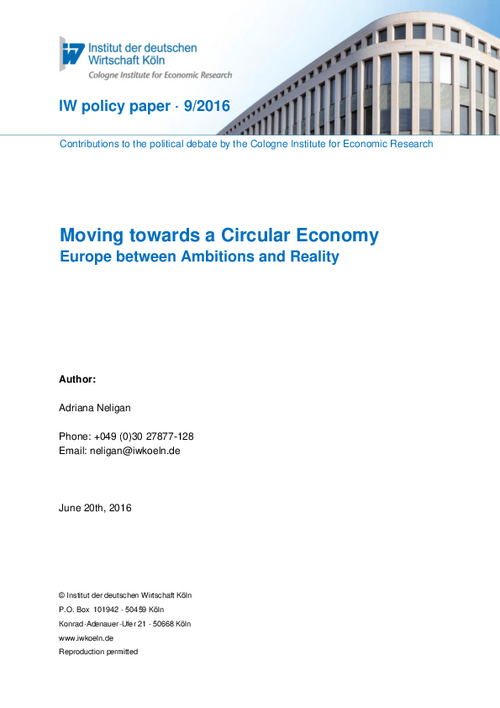The European Commission is taking serious steps towards realising the concepts of 'recycle, repair and re-use' and avoiding waste at all stages of the value chain with its EU circular economy package (December 2015). Besides setting new recycling and landfilling targets to enforce member states to climb up the waste hierarchy, the EU Commission also intends to harmonise the measuring of recycling and re-use rates in the European Union to make more transparent, how much is effectively recycled.

Moving towards a Circular Economy: Europe between Ambitions and Reality
IW policy paper

The European Commission is taking serious steps towards realising the concepts of 'recycle, repair and re-use' and avoiding waste at all stages of the value chain with its EU circular economy package (December 2015). Besides setting new recycling and landfilling targets to enforce member states to climb up the waste hierarchy, the EU Commission also intends to harmonise the measuring of recycling and re-use rates in the European Union to make more transparent, how much is effectively recycled.
Recycling of municipal waste has a long tradition in Germany, which is currently leading the EU recycling hierarchy. Only a few other countries are also on track for the new 2030 recycling targets. The United Kingdom, for instance, has undertaken huge efforts to intensify its recycling over the past decade, but many countries still need to improve further despite some positive developments in the past decade. For many member states, e.g. Romania, Slovakia and Latvia, recycling is still a foreign word. As a result, the majority of countries needs to push their recycling efforts significantly by increasing their recycling rate at higher speed until 2030 compared to the past decade. An EU-wide move towards more recycling is only realistic, if low-level recycling countries change their national waste treatment system and install a new waste management infrastructure.
A critical element in the new EU proposal is the harmonisation of the calculation method, which is combined with an implicit tightening of the targets, making it harder for all member states – including Germany – to attain the recycling targets until 2030. According to the new method Germany’s current recycling rate would range between 40 and 50 per cent instead of the reported 64 per cent, because only the waste entering the final recycling process would be defined as recycled. In this case, the German recycling rate would have to increase between 0.9 to 1.6 percentage points annually until 2030. Compared to the growth of the rate during the past decade (0.3 percentage points), Germany would have to push recycling noticeably and focus on more high-quality recycling. Fortunately, the country is a role model not only for its long recycling tradition and modern waste management, but also for its global leadership in recycling technologies. Since several member states still need to change their entire system of waste treatment to comply with the EU package, this can lead to new business opportunities for German companies making and exporting circular economy-relevant technology products and services including its experience.

Adriana Neligan: Moving towards a Circular Economy – Europe between Ambitions and Reality
IW policy paper

More on the topic

Climate Clubs as a Lightning Rod for Tensions in Trade and Industrial Competitiveness
The Paris Agreement has established a transformative paradigm. While this transformation will create winners and losers, it now seems increasingly clear that overall, there are tremendous opportunities.
IW
German Industry's Options for a Secure Supply of Raw Materials
In recent years German industry has seen a rise in the risks attached to its procurement of raw materials.
IW